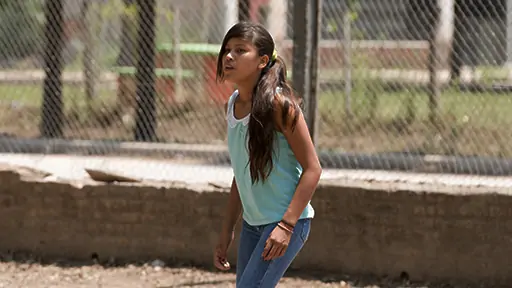Indigenous Calendar April, 2017: Not a Game

A year ago a computer program was in the headlines. While that is not unusual these days, this story was different. The artificially intelligent program, AlphaGo, beat one of the world's top players, Lee Se-Dol, in a series of games of Go. Since Go is impossibly difficult, almost everyone, including Lee himself, was confident the result would go the other way. AlphaGo made a surprise move in one of the games that it "believed" was the only winning move; it was right.
"The only winning move is not to play" was the "belief" of a fictional, rogue artificially intelligent computer program in the 1983 film, Wargames. In standard Hollywood fashion, at the last second, it saves humanity from nuclear extinction. Thirty-two years later, this indigenous Toba girl learned that her only winning move was to play.
Journalists missed a key part of last year's AlphaGo story. Commentators knew that it was a computer program, yet they liberally used phrases like: 'AlphaGo was thinking...,' 'AlphaGo was taken by surprise' and 'AlphaGo has returned to form.' A computer program thus passed a test of intelligence that Alan Turing did not even think to propose. In the year since, journalists have made another glaring mistake.
Intelligence has never been a problem to be solved. If it had been there would be many "intelligences;" no problem would remain unsolved and Lee would not be able to learn anything except Go. But this is not how evolution works. AlphaGo was able to play so well precisely because it represents a step toward general artificial intelligence — that happened to learn Go. It could just as easily have learned Chess or Poker, for example, as could Lee if he so chose. This is why, linguistically, 'intelligence' is a mass noun not a count noun. Still, we have seen a trend in the last year for journalists to refer to all examples of artificially intelligent software as "an intelligence."
Visiting a small town in Argentina's El Impenetrable region, I came across a school. This girl was the only girl playing football with a group of boys. The boys stopped the game to talk to me, but she put herself on the sideline. That didn't surprise me, but I was surprised when she didn't rejoin the game afterwards. Asked why she wasn't playing, she told me that she no longer wanted to. I knew that the real reason was my presence, so I told her that that her team might not win without her. She started playing again. I took this month's photo — her team won.
At the beginning of this year world champion Go player Ke Jie played the next generation version of AlphaGo. After he lost he said: "I would go as far as to say not a single human has touched the edge of the truth of Go." I find his comment very timely as we regress to a society where truth becomes increasingly less important. We already know that artificial intelligence will evolve rapidly and faster than human intelligence and, eventually, surpass it. Journalists have an obligation to understand this evolution before reporting on it. In three weeks the appropriately named ALPHAGO — a documentary about last year's games with Lee — will have its world premiere. I hope that filmmaker Greg Kohs has done justice to the real story.
Win or lose, this Toba girl knew that her football game that day was just a game. But her people know that survival is not a game. We can discuss the priorities of the survival problems we face — and we can agree that policing the distribution of toilet paper should be low on the list. But there should be no discussion of whether the problems are real. If we are to take survival seriously, our only winning move is to let artificial intelligence play alongside us. Whether it's the Human Brain Project or the recently-announced Neuralink, we are beginning to do that. It is important that we understand both the risks and the opportunities.
Learn more about the Toba people.
If you enjoyed reading this article, please consider supporting independent, advertising-free journalism by buying us a coffee to help us cover the cost of hosting our web site. Please click on the link or scan the QR code. Thanks!


